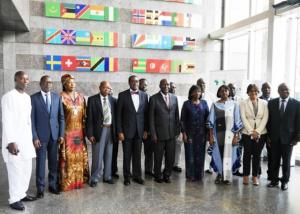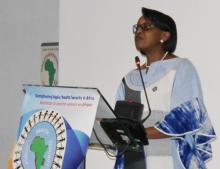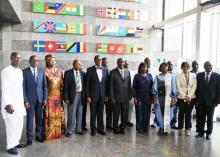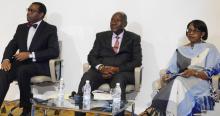Dr Moeti, WHO Regional Director for Africa, advocates building resilient health systems, increasing investments for health and mobilizing domestic resources in African countries
Abidjan (Côte d’Ivoire), 7 November 2016 – At the opening of the Ministerial Dialogue that brought together African ministers of health and finance, hosted by the African Development Bank at its headquarters in Abidjan on the theme: “From Ebola to Zika; how prepared are we and what needs to be done,” the WHO Regional Director for Africa, Dr Matshidiso Moeti, delivered three key messages.
First, she recalled the need to build resilient health systems that are able to detect and respond to epidemics and that have a multisectoral approach. “With all these emergencies, the African Region definitely requires better preparedness and resilience. Common risk factors such as inadequate access to clean water, poor sanitation and poor living conditions caused by overcrowding in homes, lie outside the domain of the health sector. Most of them are linked to the low socioeconomic status of communities, and addressing them calls for multisectoral approaches,” she stated. As part of its support to countries to improve their preparedness, WHO has undertaken a regional risk analysis and mapping for evidence-based preparedness.
In the context of the response to the Ebola epidemic, WHO has also supported 19 priority countries to increase their capacity for coordination, surveillance for early detection, and rapid response capacity including national and subnational rapid response teams. While recognizing that countries are better prepared to manage these types of outbreaks, Dr Moeti nonetheless cited major gaps in preparedness and health systems resilience to adequately respond to and cope with the impact of emergencies.
The WHO Regional Director then emphasized that sound investment in health can make all the difference. Ongoing investments in the post-Ebola recovery phase in the three most affected countries “provide unique opportunities for strengthening health systems. Improvements have been noted in rebuilding capacities for surveillance, coordination, community engagement and patient management.
The establishment of early warning systems, case detection and reporting at community, district and national levels in line with the Integrated Disease Surveillance and Response guidelines is remarkable,” she underscored. “These investments are resulting into timely detection, response and rapid control of outbreaks such as measles in Sierra Leone, and that makes all the difference.” She also stressed the importance of multisectoral actions and strong partnerships in line with the “One Health” approach in preventing and mitigating the risk of outbreaks.
Ongoing collaboration with the African Union to establish the Africa Centre for Disease Control is expected to further strengthen preparedness and response capacity in Africa.
Lastly, Dr Moeti called on African leaders to increase investments for the strengthening of health systems. “Most countries in the African Region need intensive and sustained support to strengthen their health systems. We are looking specifically at ensuring that countries have health systems that are robust, adequately staffed and financed; and equitable, able to reach all people with good quality preventive and curative services. This is the essence of Universal Health Coverage,” she asserted. She called on African leaders to increase investments in preparedness for outbreaks control, including capacity strengthening for implementing the core capacities of the International Health Regulations.
In conclusion, the WHO Regional Director for Africa called for the strengthening of partnerships for better coordinated efforts. International solidarity needs to be central to addressing collective vulnerability.
It should be recalled that the Ministerial dialogue on strengthening health security in Africa, which was organized by the African Development Bank on 7 November 2016 in Abidjan, was opened by the Prime Minister of Côte d’Ivoire, Daniel Kablan Duncan, in the presence of the President of the African Development Bank, Dr A. Adesina and Ministers of Health and Finance from Côte d’Ivoire, Sierra Leone, Liberia and The Gambia.
__________________________________________________
For more information:
Technical contact:
Dr Jean-Marie Vianny Maurice YAMEOGO, WHO Representative in Côte d’Ivoire,
Tel: 22517204,
Email: yameogoj [at] who.int
Media contact:
Mr Koné Souleymane,
Communications Officer,
Tel: 22517222, Mobile: 07148393
Email: koneso [at] who.int
__________________________________________________
01 Dr Moeti calls on African leaders to invest more in health
02 The Ivorian Prime Minister, accompanied by the President of the AfDB, the WHO Regional Director for Africa and the Ministers of Health and Finance of the invited countries
03 The Ivorian Prime Minister, Daniel Kablan, in the middle, flanked by Dr Matshidiso Moeti, to the right, and Dr A. Adesina, President of the AfDB, to the left.







